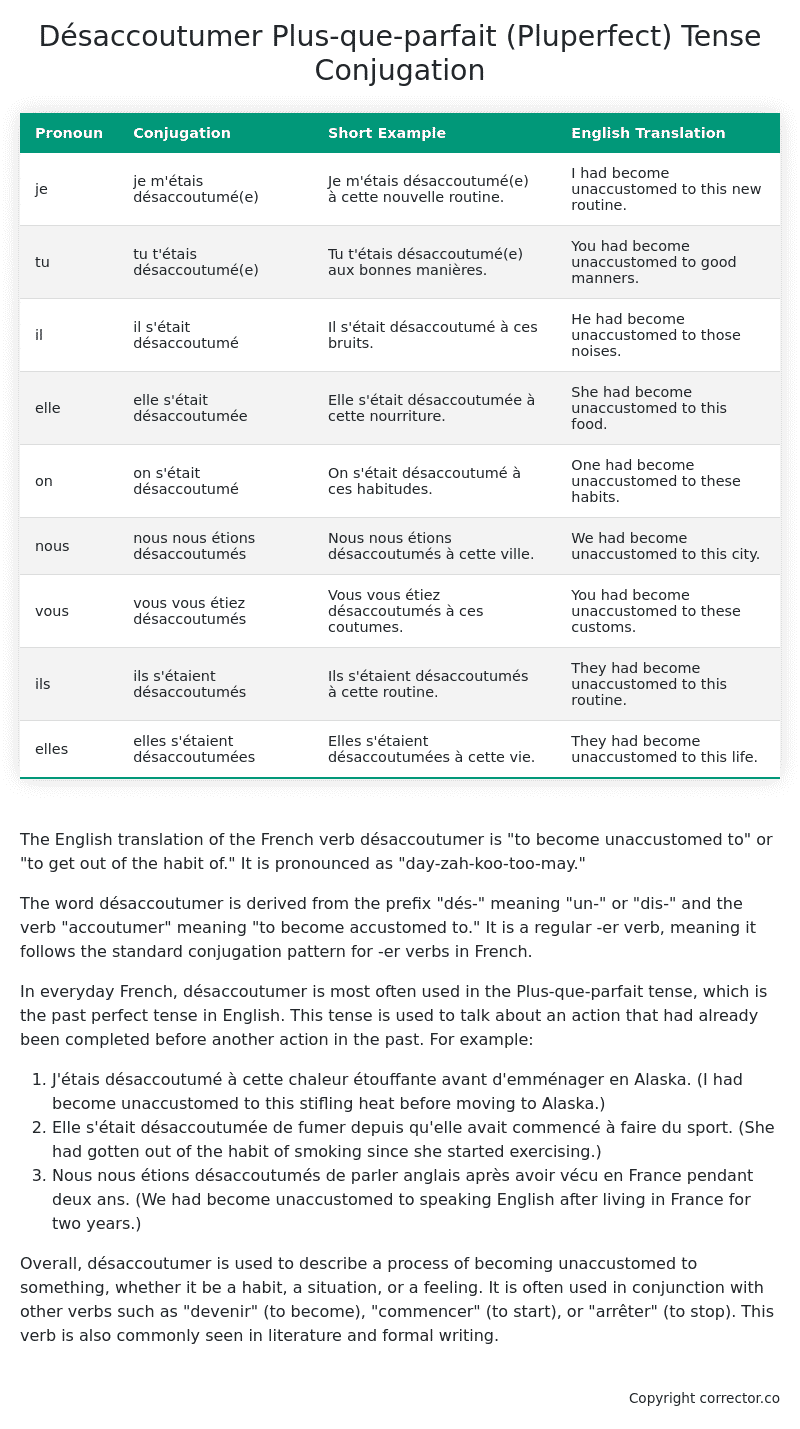Plus-que-parfait (Pluperfect) Tense Conjugation of the French Verb désaccoutumer
Introduction to the verb désaccoutumer
The English translation of the French verb désaccoutumer is “to become unaccustomed to” or “to get out of the habit of.” It is pronounced as “day-zah-koo-too-may.”
The word désaccoutumer is derived from the prefix “dés-” meaning “un-” or “dis-” and the verb “accoutumer” meaning “to become accustomed to.” It is a regular -er verb, meaning it follows the standard conjugation pattern for -er verbs in French.
In everyday French, désaccoutumer is most often used in the Plus-que-parfait tense, which is the past perfect tense in English. This tense is used to talk about an action that had already been completed before another action in the past. For example:
- J’étais désaccoutumé à cette chaleur étouffante avant d’emménager en Alaska. (I had become unaccustomed to this stifling heat before moving to Alaska.)
- Elle s’était désaccoutumée de fumer depuis qu’elle avait commencé à faire du sport. (She had gotten out of the habit of smoking since she started exercising.)
- Nous nous étions désaccoutumés de parler anglais après avoir vécu en France pendant deux ans. (We had become unaccustomed to speaking English after living in France for two years.)
Overall, désaccoutumer is used to describe a process of becoming unaccustomed to something, whether it be a habit, a situation, or a feeling. It is often used in conjunction with other verbs such as “devenir” (to become), “commencer” (to start), or “arrêter” (to stop). This verb is also commonly seen in literature and formal writing.
Table of the Plus-que-parfait (Pluperfect) Tense Conjugation of désaccoutumer
| Pronoun | Conjugation | Short Example | English Translation |
|---|---|---|---|
| je | je m’étais désaccoutumé(e) | Je m’étais désaccoutumé(e) à cette nouvelle routine. | I had become unaccustomed to this new routine. |
| tu | tu t’étais désaccoutumé(e) | Tu t’étais désaccoutumé(e) aux bonnes manières. | You had become unaccustomed to good manners. |
| il | il s’était désaccoutumé | Il s’était désaccoutumé à ces bruits. | He had become unaccustomed to those noises. |
| elle | elle s’était désaccoutumée | Elle s’était désaccoutumée à cette nourriture. | She had become unaccustomed to this food. |
| on | on s’était désaccoutumé | On s’était désaccoutumé à ces habitudes. | One had become unaccustomed to these habits. |
| nous | nous nous étions désaccoutumés | Nous nous étions désaccoutumés à cette ville. | We had become unaccustomed to this city. |
| vous | vous vous étiez désaccoutumés | Vous vous étiez désaccoutumés à ces coutumes. | You had become unaccustomed to these customs. |
| ils | ils s’étaient désaccoutumés | Ils s’étaient désaccoutumés à cette routine. | They had become unaccustomed to this routine. |
| elles | elles s’étaient désaccoutumées | Elles s’étaient désaccoutumées à cette vie. | They had become unaccustomed to this life. |
Other Conjugations for Désaccoutumer.
Le Present (Present Tense) Conjugation of the French Verb désaccoutumer
Imparfait (Imperfect) Tense Conjugation of the French Verb désaccoutumer
Passé Simple (Simple Past) Tense Conjugation of the French Verb désaccoutumer
Passé Composé (Present Perfect) Tense Conjugation of the French Verb désaccoutumer
Futur Simple (Simple Future) Tense Conjugation of the French Verb désaccoutumer
Futur Proche (Near Future) Tense Conjugation of the French Verb désaccoutumer
Plus-que-parfait (Pluperfect) Tense Conjugation of the French Verb désaccoutumer (this article)
Passé Antérieur (Past Anterior) Tense Conjugation of the French Verb désaccoutumer
Futur Antérieur (Future Anterior) Tense Conjugation of the French Verb désaccoutumer
Subjonctif Présent (Subjunctive Present) Tense Conjugation of the French Verb désaccoutumer
Subjonctif Passé (Subjunctive Past) Tense Conjugation of the French Verb désaccoutumer
Subjonctif Imparfait (Subjunctive Imperfect) Tense Conjugation of the French Verb désaccoutumer
Conditionnel Présent (Conditional Present) Tense Conjugation of the French Verb désaccoutumer
Conditionnel Passé (Conditional Past) Tense Conjugation of the French Verb désaccoutumer
L’impératif Présent (Imperative Present) Tense Conjugation of the French Verb désaccoutumer
L’infinitif Présent (Infinitive Present) Tense Conjugation of the French Verb désaccoutumer
Struggling with French verbs or the language in general? Why not use our free French Grammar Checker – no registration required!
Get a FREE Download Study Sheet of this Conjugation 🔥
Simply right click the image below, click “save image” and get your free reference for the désaccoutumer Plus-que-parfait tense conjugation!

Désaccoutumer – About the French Plus-que-parfait (Pluperfect) Tense
Tense Formation
Common everyday usage patterns
Sequencing of past events
Background information
Hypothetical or reported speech
Interactions with other tenses
Summary
I hope you enjoyed this article on the verb désaccoutumer. Still in a learning mood? Check out another TOTALLY random French verb conjugation!


